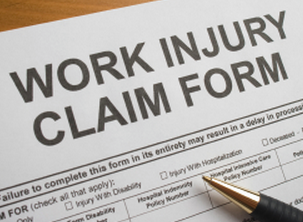
Work places are where people go to earn a living.
No one expects (or wants!) to have a work place injury, because that disrupts your work life.
But knowing how to deal with work injury claims, should a work-related incident occur, is always advisable. Knowing how to file your claim in advance makes dealing with a work injury much less stressful.
Tips to expediting your work injury claims
Follow these 6 tips on how to file work injury claims to ensure your claim is processed quickly and without delays:
1. Notification: Workers often do not notify an employer immediately about an injury sustained at a work site. Hoping that injuries will soon heal, or thinking that they are not serious enough to merit filing work injury claims are some reasons for delayed notifications. Sometimes notifications are delayed because workers may feel their injuries might mean other co-workers will have to pick up the slack in their absence.
That is a BIG mistake. If you get hurt at your worksite, report it immediately. And more importantly, report it to the authorized person (Supervisor, Foreman, Manager).
2. Getting the 'paperwork' right:
All work injury claims are initiated through designated "paperwork".
These might either be hard copy forms, or online documents.
Regardless of what format they take, make sure you use the correct "paperwork" to report your injury.
More importantly, make sure you get everything right – down to the correct spelling of your name, and the exact date, place and time (as far as you can remember) of the injury.
Claims can often be expunged because the "little details" don't match!
3. Getting the right medical attention:
Some injuries might require that you seek immediate and appropriate medical aid.
Make sure that you follow your employer's rules/regulations when getting such aid.
If the company has a fully equipped, 24/7 staffed, and well supplied medical facility to treat your particular injury on-site, then visiting a doctor 10 miles away to get aid may be viewed as "suspicious" when it comes to evaluating your work injury claims. Using "unapproved" physicians or pharmacies can also be grounds for dismissing an otherwise valid claim.
4. Following medical advice closely:
It may be that the approved physician/health care provider prescribes a specific course of treatment. Many work injury claims get rejected because the injured worker failed to follow medical advice accurately.
If you have been forbidden from carrying weights above a certain limit post your injury, then take that advice seriously.
If you are told to rest (at home or a recovery facility) for 5 days, then resting for 6 days may cause you to forfeit lost wages.
5. Documenting your recovery:
From the moment you get injured, try to document everything that happens to you. Save all injury-related emails or communications. Carefully file treatment or medication receipts and statements.
Make copies of all your prescriptions before submitting them to the pharmacy. Even ask for copies of physician's reports or your police statements (if the police were required to attend the scene of the incident). Some work injury claims are fiercely contested by the insurance companies.
Having a well documented trail of events can greatly bolster your claim for compensation.
If you had colleagues or other individuals witness the injury, this is the time to request them to validate your account. Their corroboration might not be required, but it could in the event that the employer decides to contest your claim.
6. Know your rights: No one has the right to discourage injured workers from filing work injury claims.
And employers are forbidden by law from taking punitive action against injured employees that file such claims.
However, it may not help your claims process if you try to "work the system" or "pull a fast one". If employers suspect that you are "faking it", that could not only be grounds for delaying or denying your claims, but other action may follow – including dismissal or even criminal charges.
Be aware of changes
Various States, and even the Federal government, have different (albeit similar) processes in place to file work injury claims. And there may even be differing protocols amongst employers on how workplace injuries are dealt with. Just because you are familiar with the process you used elsewhere, don't assume it's the same at your work place.
If you want your claims to proceed without any major hiccups, then you need to take time now to familiarize yourself with the specifics of how work injury claims are reported, recorded and processed in your state, and at your workplace.






